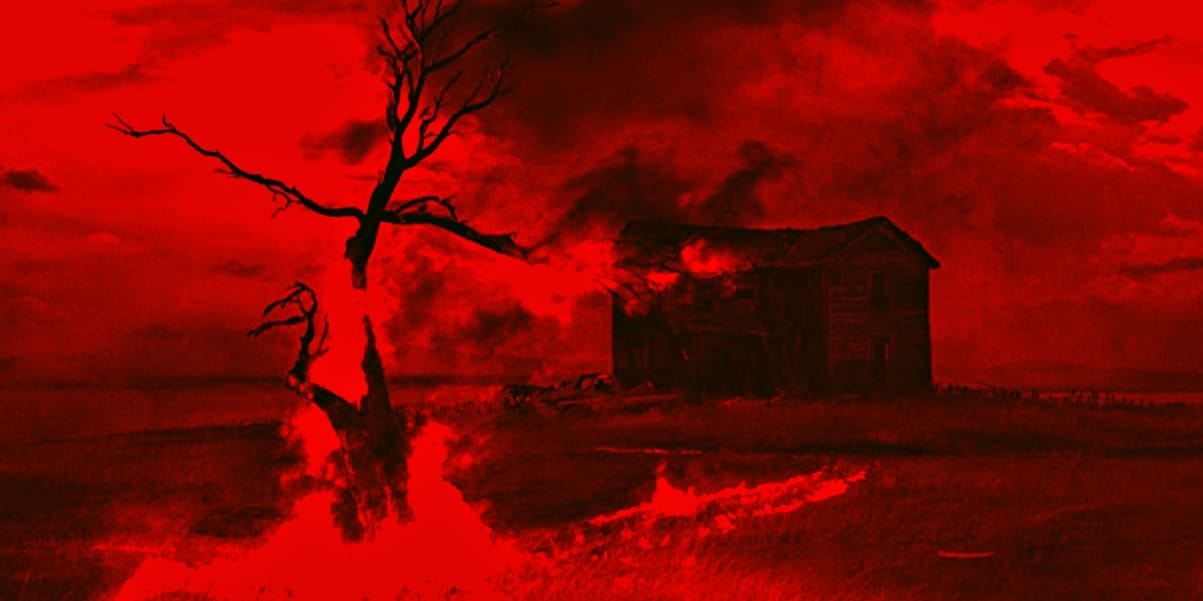What did Josiah notice? According to the beginning of the film, he sees a dancing leprechaun pooping out a rainbow.
Josiah Graham (Robert Patrick), who appears to be prone to having visions, most likely did not see this leprechaun for real. Despite his apparent lunacy, the things he sees have real-world implications. However, not all of his sights are as cheerful as a small green man doing a jig for his watching enjoyment.
He sees even more terrible things in this Southern gothic tale of family pain, abuse, and (seemingly) supernatural goings-on, including a vision of his dead wife who has warnings for both him and his children about the misdeeds of their past.
What exactly are these sins? That is for you to discover if you decide to view this scary chiller. Josiah is not a kind man, and neither are his grown children, Eli, Tommy, and Mary, who all have secrets of their own. As the film progresses, their secrets (or crimes) are revealed, and they will most likely make you sick. Any further explanation would be a disservice to filmmaker Vincent Grashaw, who takes his time telling the truth about the Graham family and the awful crimes that led to Josiah’s wife Miriam hanging herself from a tree.
The film is divided into three chapters, and while they may appear disconnected at first, the events of each are gradually woven into the overall plot. It’s important to pay attention to the dreams and prophesies that each character receives during these chapters (including the vision about the leprechaun), as they are all crucial to the heroes’ adventures as they reach the violent and tragic conclusion.
We meet Josiah and his son Tommy (Scott Haze) in the opening chapter, and it quickly becomes evident that their connection is unhealthy. A scene in Tommy’s bedroom is extremely disturbing, and it suggests that Tommy may have been abused as a youngster by his father.

Josiah unexpectedly becomes’religious’ in this chapter after experiencing a vision of his dead wife burning in hellfire. She tells him that the only way the family will be saved is if he corrects the faults of the past. Failure to do so will result in them all being burned in hell, so Josiah takes no time in teaching Tommy on what he must do to save his soul.
The second chapter focuses on Eli (Nick Stahl) and his criminal history. He is urged to steal gold from some visiting gypsies in order to repay a debt to the local town thug. In the process, he is able to atone for the crime for which he was convicted, but as we learn more about Eli in the third chapter, we discover that he has more “sins” that must be atoned for.
In the third chapter, we meet Mary (Kelli Garner), who is equally as tormented as her male siblings. This is indicated by the Ketamine bottle she keeps in the bathroom cupboard, but we don’t have time to dwell on her mental state for long since Eli appears at her door with news of an offer from an oil company to purchase their old family land. They return to their ominous childhood house and reunite with Tommy, but while their union is initially joyous, things take a dark and violent turn when the family’s crimes are revealed.
Throughout the film’s chapters, the director succeeds to create a sense of dread. He takes his time revealing the horrific events at the crux of the Graham family’s sinister past, but when he does, they hit us like a thunderbolt. They are quite unsettling in nature, so we must warn you that the things you see and hear may be triggering to you if But, as disturbing as the narrative is, if you have the stomach for its more violent components, this isn’t a movie to pass up. All of the key characters’ acting is excellent, particularly Scott Haze, who deserves to be far more famous than he is. You might recognize him from James Franco’s Child Of God (Hey, Cormac McCarthy!), in which he played a dispossessed guy attempting to exist outside of society. He was as amazing as the lonesome soul in that film as he is as the tortured individual in this one, and it’s about time he was given more roles that allowed him to demonstrate his exceptional acting abilities. you have had childhood traumas of your own.
However, all of the ensemble deserves praise, as does the cinematographer, Carlos Ritter, who expertly fits the somber tone of the story with the dark and oppressive vision that he captures on film. This is a high-quality production in every way, yet the film’s subject matter and length can make it difficult to watch at points.
Fortunately, the superb acting of the ensemble and the masterful storyline keep us interested, as it’s easy to feel immersed in the lives of these characters, even if they aren’t always nice.
What Josiah Saw has a notable amount of script-iness. The film is dialogue-driven, and it is often effortful and genuine in the manner that first-time feature scripts are. These awkward vulnerable spots, for the most part, blend into the Southern Gothic tendency for melodramatic. In a dialogue-heavy movie with fat to trim, some of these sweatier sequences could have been cut.
Ramona Frost reviewed for Futuristika. ✪
![[Futuristika!]](https://futuristika.org/wp-content/uploads/2020/12/futuristika.png)
